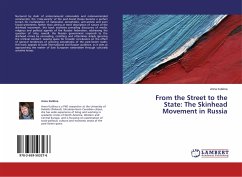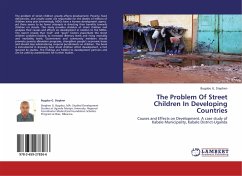Nurtured by clash of anticommunist nationalists and national-minded communists, the 'crisis-society' of the post-Soviet Russia became a perfect terrain for revitalization of nationalist, xenophobic, anti-semitic and even fascist sentiments. Rather than aiming at mere description of nature of the skinhead movement, this book examines prevailing discourses of media, religious and political agenda of the Russian Federation, addressing the question of 'why, overall, the Russian government responds to the skinhead crimes by concealing, remitting and oftentimes simply ignoring the criminal conduct'. Leaving space for broader conclusions on the effect of general tendencies of growing xenophobia of the post-Soviet realm, this work appeals to both international and Russian audience, as it aims at approaching the matter of East European nationalism through culturally sensitive lenses.
Bitte wählen Sie Ihr Anliegen aus.
Rechnungen
Retourenschein anfordern
Bestellstatus
Storno








